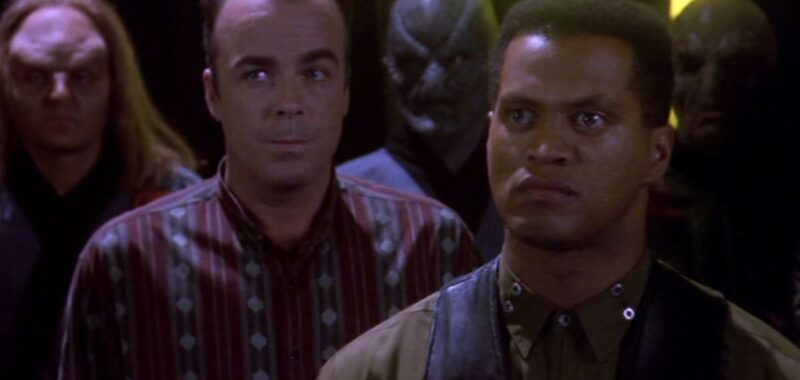“TKO”
Written by Lawrence G. DiTillio
Directed by John C. Flinn III
Season 1, Episode 14
Production episode 119
Original air date: May 25, 1994
It was the dawn of the third age… A passenger liner arrives from Earth, and two men part ways, having enjoyed talking to each other on the trip. One is Walker Smith, who finds Garibaldi in downbelow trying to arrest a couple of thieves by his lonesome, and almost gets stabbed in the back. Smith, however, takes the would-be stabber out with one punch, teasing Garibaldi that he always forgets to watch his back. Later, Garibaldi and Smith meet at a sports bar for burgers and to catch up. Smith is a boxer, who’s been disgraced. Smith explains that he refused to throw a fight for money. Said bribers then framed him, planting evidence that he’d used performance enhancements. He’s trying to resurrect his career by fighting in the Mu-tai, an alien combat competition. Garibaldi thinks he’s nuts, as few humans have ever participated, and they’ve all gotten their asses kicked.
The other passenger is Rabbi Yossel Koslov, who is there for Ivanova. An old friend of Ivanova’s father Andrei, Ivanova refers to him as “Uncle Yossel.” He presided over Andrei’s funeral, and he has come to B5—his first trip off Earth—to provide comfort to Ivanova, and also to give her her legacy from her father: a samovar that has been in the family for three centuries. Koslov is disappointed to learn that Ivanova never sat shiva for her father. Ivanova dismisses the notion of doing so now, as she is far too busy with her duties.
Garibaldi accompanies Smith to the Mu-tai dojo on the station. The Muta-Do, the person in charge (who, according to Garibaldi, is 90 years old and has fought over a thousand matches), dismisses Smith, saying humans aren’t allowed in the Mu-tai. Smith’s arrogant attitude doesn’t help matters, nor does the fact that the Muta-Do knocks him on his ass without breaking a sweat.
After leaving in disgrace, Smith is approached by an alien named Caliban, offering to help him get into the Mu-tai.
Koslov meets with Sinclair to discuss Ivanova. Sinclair is shocked to learn that Ivanova’s father died, and Koslov is shocked that Sinclair is shocked. Koslov asks Sinclair if he’ll give Ivanova time off to sit shiva, and Sinclair unhesitatingly agrees. Ivanova, however, is royally pissed off that Koslov yenta’d on her behalf to her CO, so much so that she walks out on him in the middle of dinner at Fresh Air. Later, Sinclair offers to give her the time off that he promised Koslov to give her, which she refuses.
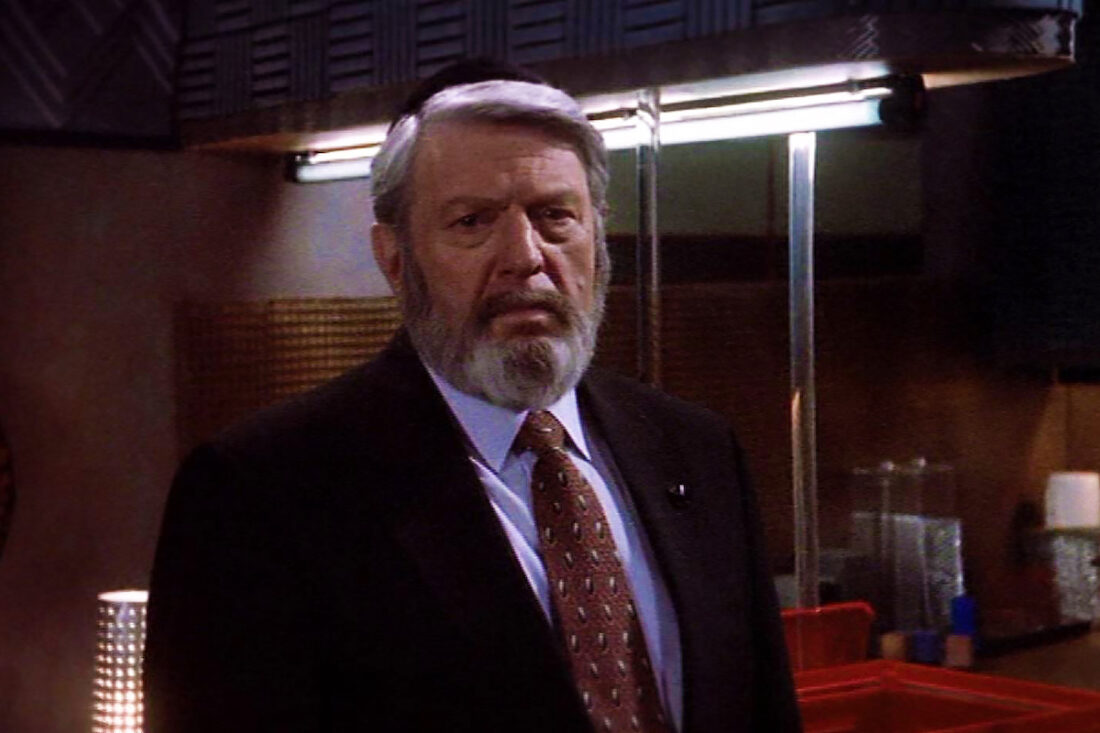
Smith apologizes to Garibaldi, and offers two tickets to the latest Mu-tai tournament. They attend—they’re pretty much the only humans in the place—and watch as the Sho-rin, an alien named Gyor, wins the championship handily, again. As is traditional, the Muta-Do asks if anyone will challenge the Sho-rin, and Smith does so. Because he observed the proper forms (coached by Caliban), the Muta-Do accepts the challenge and the fight will happen in three days.
Two people react badly to this. One is a Grome, who doesn’t think humans belong in the Mu-tai. The other is Garibaldi, who thinks Smith will get his stupid ass killed. The next three days, however, prove that Smith’s long-term plan—to get himself back on the boxing map, as it were—is working. The news feeds are full of stories about Smith being the first human to participate in the Mu-tai. This is the first time he’s made the news for something other than being a cheat since he was framed. It’ll be his ticket back into the mainstream boxing world.
Koslov makes one last attempt to get Ivanova to sit shiva for her father, but she refuses. She still hasn’t forgiven him for emotionally abandoning her after her mother committed suicide. Koslov resigns himself to the fact that Ivanova won’t allow herself to grieve and takes his leave.
However, as he’s about to board the liner home, Ivanova remembers her covert conversations with her father on his deathbed, when he expressed regret for how he treated her, and agrees to sit shiva. She asks Sinclair for the time off—he not only grants it, but also asks to attend.
Ivanova and Koslov sit in the former’s cabin, surrounded by several friends, including Sinclair. Ivanova recalls happier times with her father and then Koslov leads them in prayer—which, at Ivanova’s request, is done in English in deference to the not-Hebrew-speaking Sinclair (and also to the not-Hebrew-speaking audience…).
Smith faces off against the Sho-rin, and it’s a brutal fight. At first, Smith is getting his ass kicked, but he rallies and it quickly becomes an even match. At one point, the Grome tries to shoot Smith to stop the human from sullying the Mu-tai, but Garibaldi stops him, confiscates the weapon, and has him arrested.
Eventually, the Muta-Do declares it a draw. The crowd cheers for the Sho-rin, but the Sho-rin gets the crowd to chant Smith’s name instead, out of respect for how well he fought. The Muta-Do declares that humans are now welcome in the Mu-tai. Smith heads back to Earth, reminding Garibaldi to watch his back.
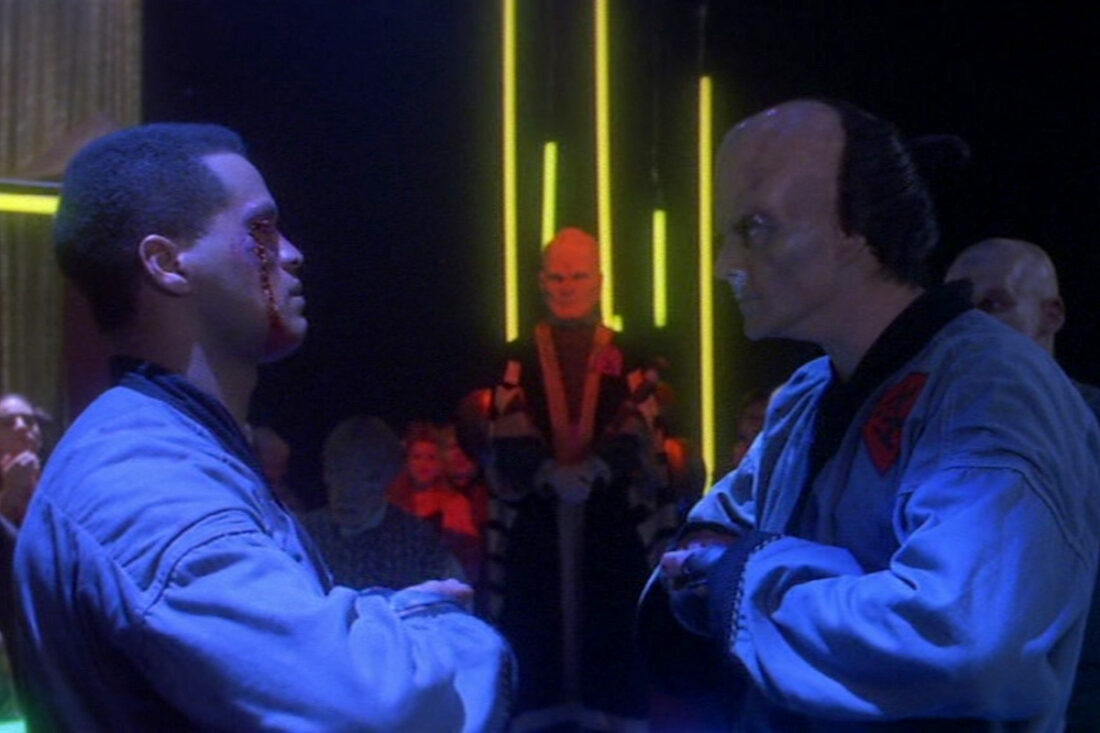
Nothing’s the same anymore. Sinclair is hilariously caught off-guard by Koslov’s declaration that Ivanova’s dad died months ago.
Ivanova is God. During the shiva, Ivanova tells the story of how her father took her to see a writer named Kasherev, whom she greatly admired, at the age of 13. Andrei didn’t think much of him, but barely teenaged Ivanova insisted and whined and eventually convinced him to take her to Kasherev’s talk. Ivanova had a question for him that she’d been refining and rehearsing for ages. However, when she asked it, Kasherev belittled her question and her as a “bourgeois twit barely out of diapers” and refused to answer it. Andrei then stood up and rebuked Kasherev, saying that if he wasn’t a pacifist, he’d horsewhip him through the streets of St. Petersberg for being so rude to his daughter. After they left, Andrei said that he thought her question was excellent.
The household god of frustration. Garibaldi first met Smith when he arrested him for starting a fight in Fortune City. They became friends afterward. Smith expresses surprise that Garibaldi is drinking water with his hamburger. Apparently Garibaldi was still very much in the drinking phase of his alcoholism when he and Smith first met.
If you value your lives, be somewhere else. Although several aliens are seen watching the Mu-tai, there are no Minbari among them. J. Michael Straczynski said online back in the day that, “It ain’t their thing.”
No sex, please, we’re EarthForce. When Ivanova returns to duty, Sinclair expresses gratitude that she’s back in the proverbial saddle, as it was rough going with her taking time off, and Ivanova tartly reminds him to remember that the next time Sakai comes on board…
Looking ahead. Smith twice mentions that Garibaldi needs to watch his back more often. Garibaldi’s inability to observe his rear will be an issue down the line…
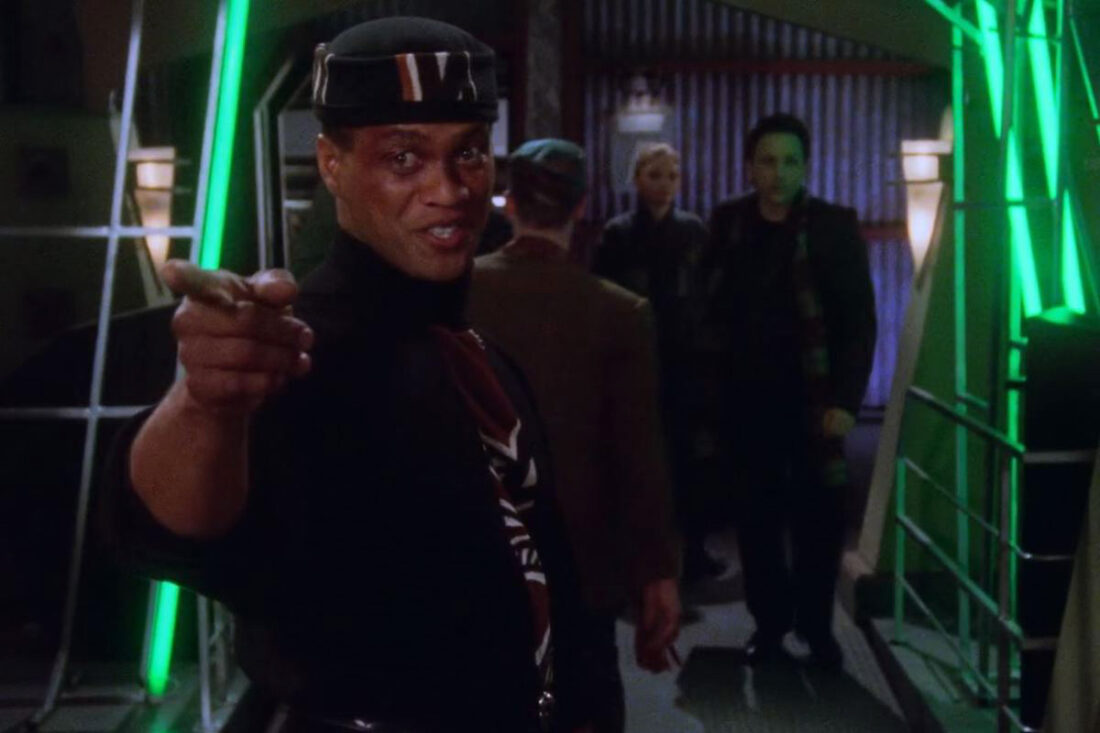
Welcome aboard. Greg McKinney plays Smith, Don Stroud plays Caliban, and Lenore Kasdorf makes her first of three appearances as an ISN reporter. Robert Phelan returns from “Born to the Purple” as Andrei in a flashback. The great Soon-Teck Oh plays the Muta-Do, while James Jude Courtney—probably best known for playing Michael Myers in the Halloween films—plays the Sho-rin.
But the big guest is the late great Theodore Bikel as Koslov. Bikel was an Oscar-nominated movie actor (for The Defiant Ones), a veteran theatre actor (he was the first to play Captain von Trapp in The Sound of Music on Broadway), a television actor (he played Worf’s foster father in Star Trek: The Next Generation’s “Family”), a folk singer (he co-founded the Newport Folk Festival—among other things, it was at that festival in 1965 when Bob Dylan first went electric), and activist.
Stroud, Courtney, and Bikel will all return to the franchise, albeit in different roles: Stroud as Boggs in “Ceremonies of Light and Dark,” Courtney as a Narn in “Sic Transit Vir,” and Bikel as Lenonn in In the Beginning.
Trivial matters. It was established back in “Born to the Purple” that Ivanova’s father was dying, and also that Ivanova was communicating with him covertly, not through official B5 channels, which is why Sinclair was unaware of it. Ivanova’s mother’s suicide was established in “Midnight on the Firing Line.”
Garibaldi being an alcoholic, and his current residency on the proverbial wagon, was established in “Survivors.”
Walker Smith is named after the great boxer Sugar Ray Robinson, who was born with the name Walker Smith Jr.
Ivanova is seen reading Harlan Ellison’s autobiography Working Without a Net. This autobiography doesn’t exist, though Ellison had been saying at the time of B5 that he would write it around the turn of the millennium. In 2008, Ellison said he’d signed a contract with HarperCollins to do the book through their Ecco Publishing imprint, and the book was even listed in various catalogues and online as forthcoming (there’s still an Amazon page for it), but he never finished it before his death in 2018.
The passenger liner that goes between Earth and B5—on which both Walker and Koslov travel in both directions—is called the White Star. This is worth mentioning for two reasons. One, B5 will get a support vessel in the third season also called the White Star. Two, White Star Line is the name of the cruise line that owned and operated the RMS Titanic.
Caliban is presumably named after the character from William Shakespeare’s The Tempest.
The echoes of all of our conversations.
“So how are things back home?”
“They change, they stay the same. Russia is Russia. Your father used to say, ‘If regret could be harvested, Russia would be the world’s fruit basket’.”
—Ivanova and Koslov making small talk.
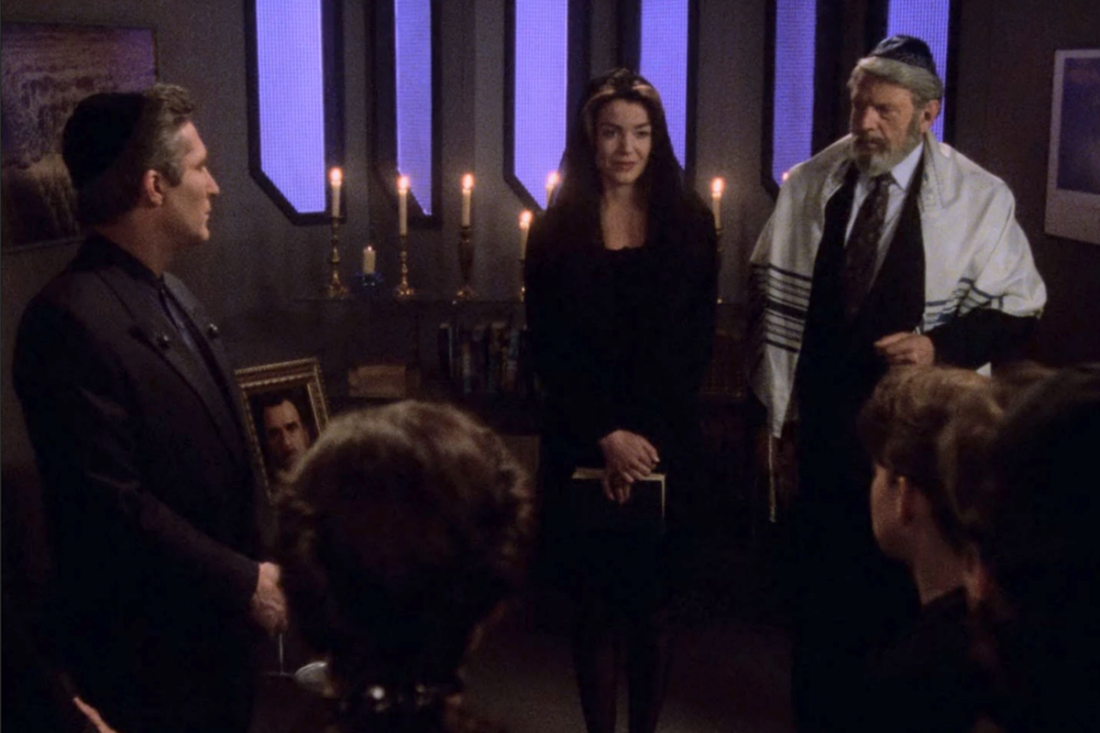
The name of the place is Babylon 5. “You cannot run away from your own heart, Susan.” When people are listing the worst episodes of B5, “TKO” is almost always featured on the list, so I am now going to declare something that will possibly get me tarred and feathered: “TKO” was always my favorite first-season episode, going back to when the show first aired thirty years ago. And I still like it a lot.
Not, I hasten to add, for the A-plot, though I have a lot more thoughts on that now that I have twenty years of martial arts under my (black) belt. But I love this for the absolutely magnificent B-plot, and I don’t see how anyone who actually cares about the character of Susan Ivanova can call this one of the worst episodes when half of it is devoted to her, and it is brilliantly written and acted.
First of all, I was over the moon at the fact that B5 actually acknowledges that there are Jews in the future, something that remains vanishingly rare. Indeed, routine portrayal of Jews in any pop culture only really started happening about thirty years ago or so, and it still remains scattershot. In 1994, I was married to a Jewish woman, so I was particularly sensitized to it, and I remain so even though that particular marriage ended two-and-a-half decades ago.
Secondly, nobody ever went wrong casting Theodore Bikel, and he is magnificence itself as Koslov.
Thirdly, the plotline itself is hugely important for Ivanova, not just because it establishes her Judaism, but also continues the work begun in “Midnight on the Firing Line” and “Born to the Purple” of showing her difficult childhood and how that helped turn her into the overly stoic and incredibly cynical adult she is now.
Meantime, we have the absurd A-plot, which is one of the worst examples of The Inevitable Boxing Episode that so many shows have foisted on their audiences, including other genre shows like Batman (“Ring Around the Riddler”), Battlestar Galactica (“Unfinished Business”), Buck Rogers in the 25th Century (“Olympiad”), Future Cop (“Fighting O’Haven”), Quantum Leap (“The Right Hand of God”), and Star Trek: Voyager (“The Fight”).
What makes “TKO’s” version particularly terrible, though, because while the Mu-tai appears to be the usual Space Boxing nonsense, where it’s like regular boxing only alien, it is, um, not. What we see in the Mu-tai is basically Asian martial arts. They even wear gis! (A gi is a martial arts uniform.) And belts! (Okay, they’re sashes, but they’re color-coded just like the belts in Asian martial arts.) Rather than go through the trouble of actually creating an alien form of sport combat, Lawrence G. DiTillio just gave us a mishmash of kung fu, karate, judo, taekwondo, jeet kune do, etc. The casting and costuming just overemphasizes this, the former with the casting of the (excellent) Soon-Teck Oh as the Muta-Do. (And that’s another thing! Muta-Do sounds like a title you’d hear in a karate school.)
Now the thing is, this isn’t a bad metaphor for a conflict that has happened in the martial arts world. As Asian martial arts started to proliferate around the world in the 1960s and 1970s, prompted by military personnel in the region for the Korean and Vietnam wars learning about them, as well as the meteoric popularity of Bruce Lee, there was a conflict between maintaining the perceived purity of the art versus the proliferation and popularization of it in other countries. There was a Kyokushin tournament held in Japan in 1976 whose primary purpose was to reassert the dominance of Japanese karateka in the martial arts world (and the judging was very obviously biased toward the Japanese participants—see the documentary Fighting Black Kings for more on that).
But the metaphor falls down because the Mu-tai is such a lazy kitbash of Asian martial arts that it only works as being alien if you’re a Westerner. Me, I’m looking at the Mu-tai in general and the Sho-rin in particular and thinking that I know about a dozen martial artists in the New York Metropolitan Area alone who would do just fine in the Mu-tai. There is absolutely nothing in it that truly bespeaks something that it would be tough for humans to manage. (It also highlights one of B5’s flaws, which is the poor representation of Asians in its future.)
I will give some credit to the fight choreographers, as the climactic bout between Smith and the Sho-rin is well done. I particularly like the fact that, while the Sho-rin uses punches and kicks—as do all the other participants in the Mu-tai—Smith sticks with what he’s good at: boxing. All his moves are punches, and he moves and fights like a boxer rather than a martial artist. It’s a nice touch. (Though his lack of experience with defending against kicks is something that should do him in, and it doesn’t.)
The Ivanova subplot means that this will continue to be my favorite first-season episode. Even if the A-plot is awful…
Next week: “Grail.”

